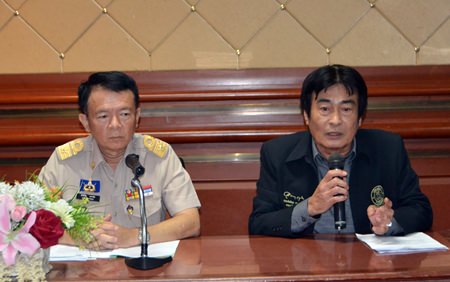Even as Thailand’s military regime clears Phuket and Hua Him beaches of chairs, umbrellas and food vendors, local officials are cementing the hold of vendors over half of Pattaya’s public shoreline through new regulations.
Banglamung District Chief Sakchai Taengho and Pattaya Deputy Mayor Ronakit Ekasingh announced the detailed list of prohibitions and allowances to vendors Aug. 22, claiming they were yielding to “enormous” amounts of public complaints by now limiting chair vendors to just 50 percent of the beach. Previous regulations allowed vendors to occupy up to 65 percent of the sand.
 Banglamung District Chief Sakchai Taengho (left) and Deputy Mayor Ronakit Ekasingh (right) announce a detailed list of prohibitions and allowances to the over 200 vendors in attendance.
Banglamung District Chief Sakchai Taengho (left) and Deputy Mayor Ronakit Ekasingh (right) announce a detailed list of prohibitions and allowances to the over 200 vendors in attendance.
Such a “concession” stands in stark contrast to Phuket and Hua Hin where the National Council for Peace and Order has used soldiers to remove every last beach chair, umbrella and food stand from the beach to restore the shoreline’s natural beauty. With the junta moving methodically throughout the country’s beach resorts, some say – many hopefully – that it could be only a matter of time before real change comes to Pattaya’s beaches.
Until then, the vendors will have “no problem” operating on the beach, provided they follow the rules, Sakchai said.
Vendors can operate from 7:30 a.m. to 6:30 p.m. and deploy 40 lounge chairs and 35 umbrellas in their 7-meter-wide plot (49-sq meters total). Chairs must be neatly organized in off hours and no cooking will be allowed. Also, no pets or vehicle parking is allowed.
Food can be promoted and sold on the beach, but cooking on the beach is strictly forbidden. A price list must be available to inform people food prices before they order. Merchants will cook the food on the opposite side of the road, which will be brought and served to people on the beach. Soft drinks and cigarettes can be sold, but not advertised.
Rubber tubes are restricted to 10 in number and prices for these, along with seafood for sale, must be posted. Finally, vendors are banned from sleeping on their plots at night.
Sakchai admitted that regulation of beach-chair operators has been a constant struggle, with many exceeding past the boundaries of their allocated spaces. The problem has been especially bad in Jomtien where vendors have gotten in conflicts over space, resulting in requests for even more public land to be given to private sellers.




